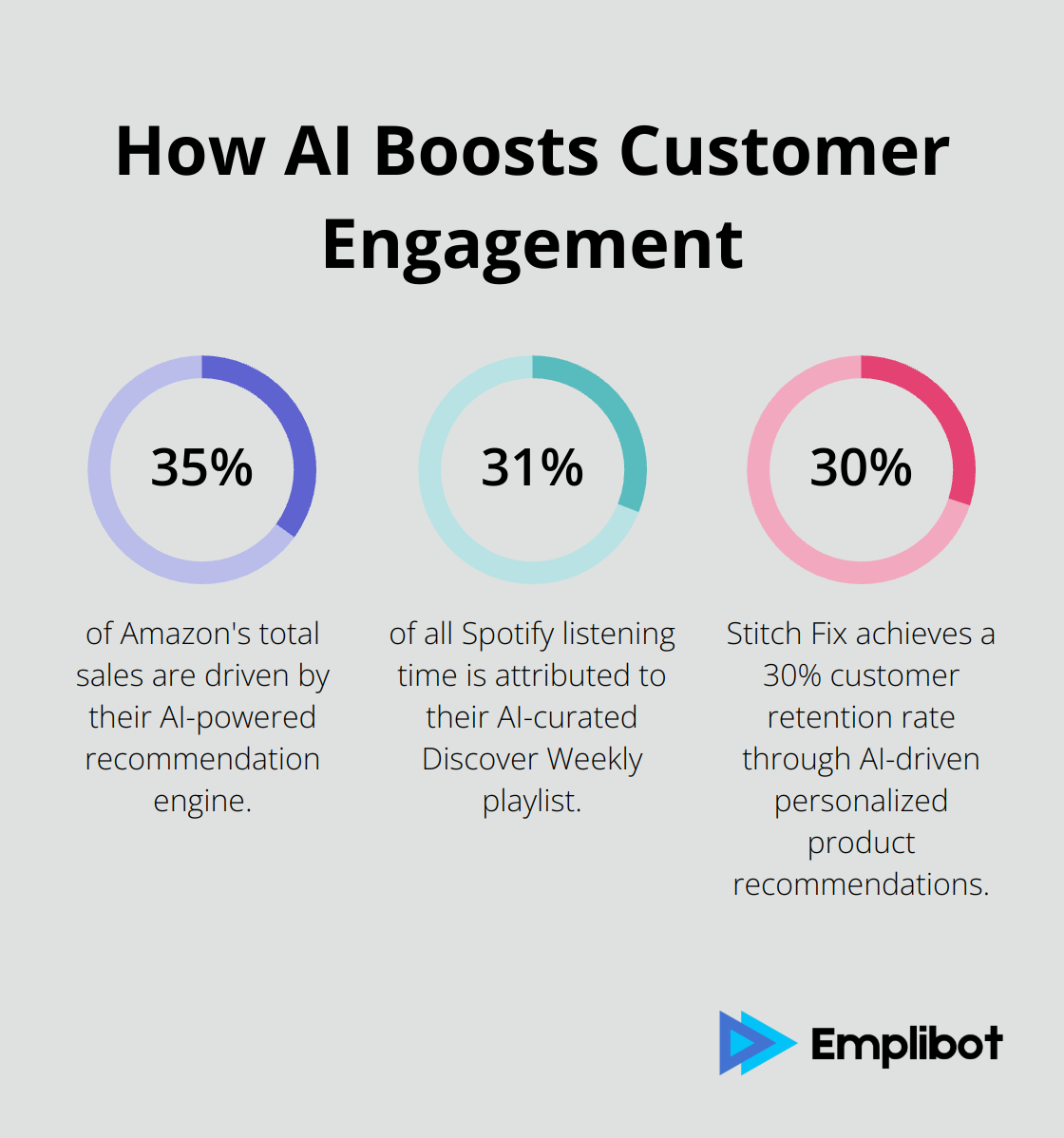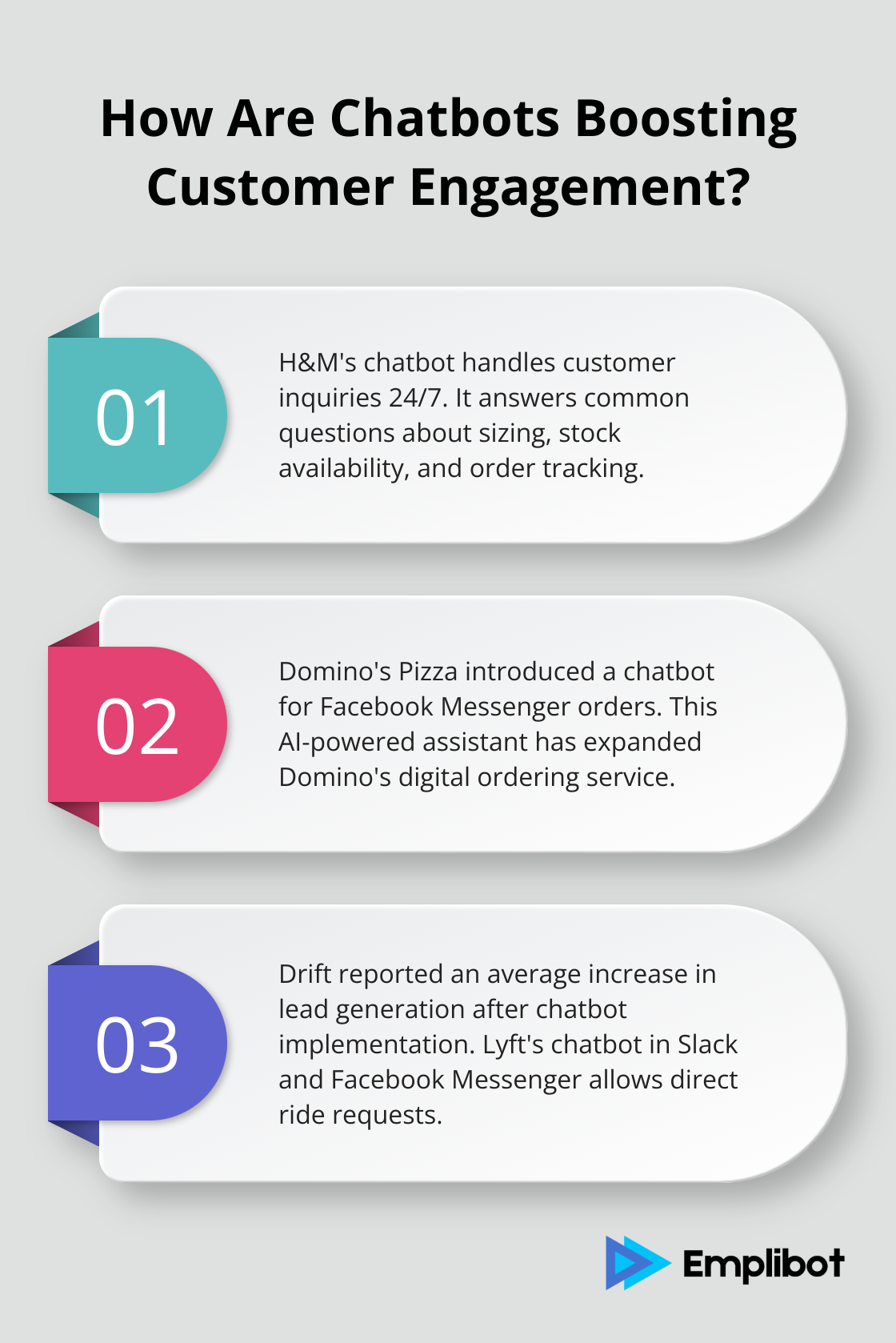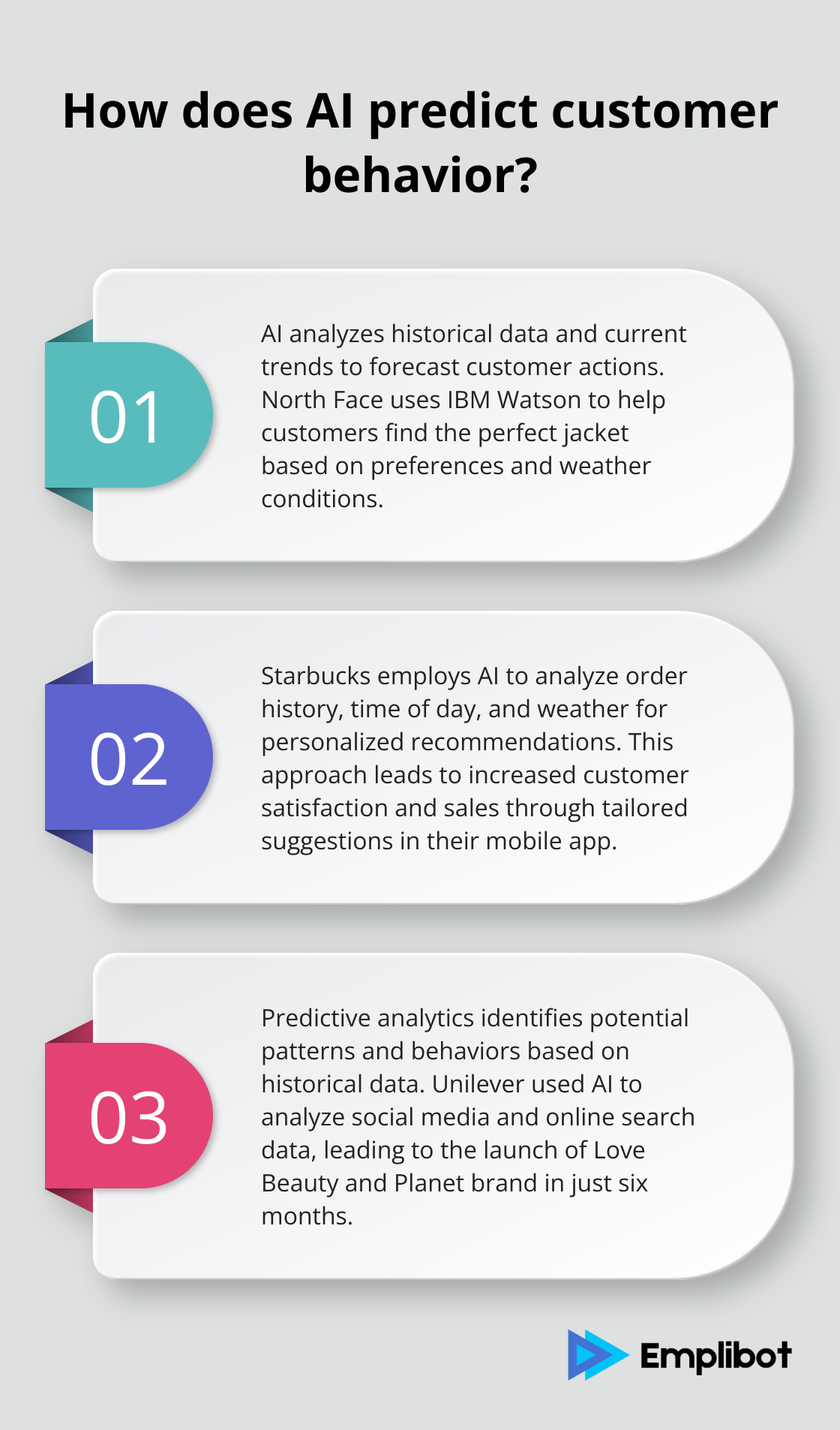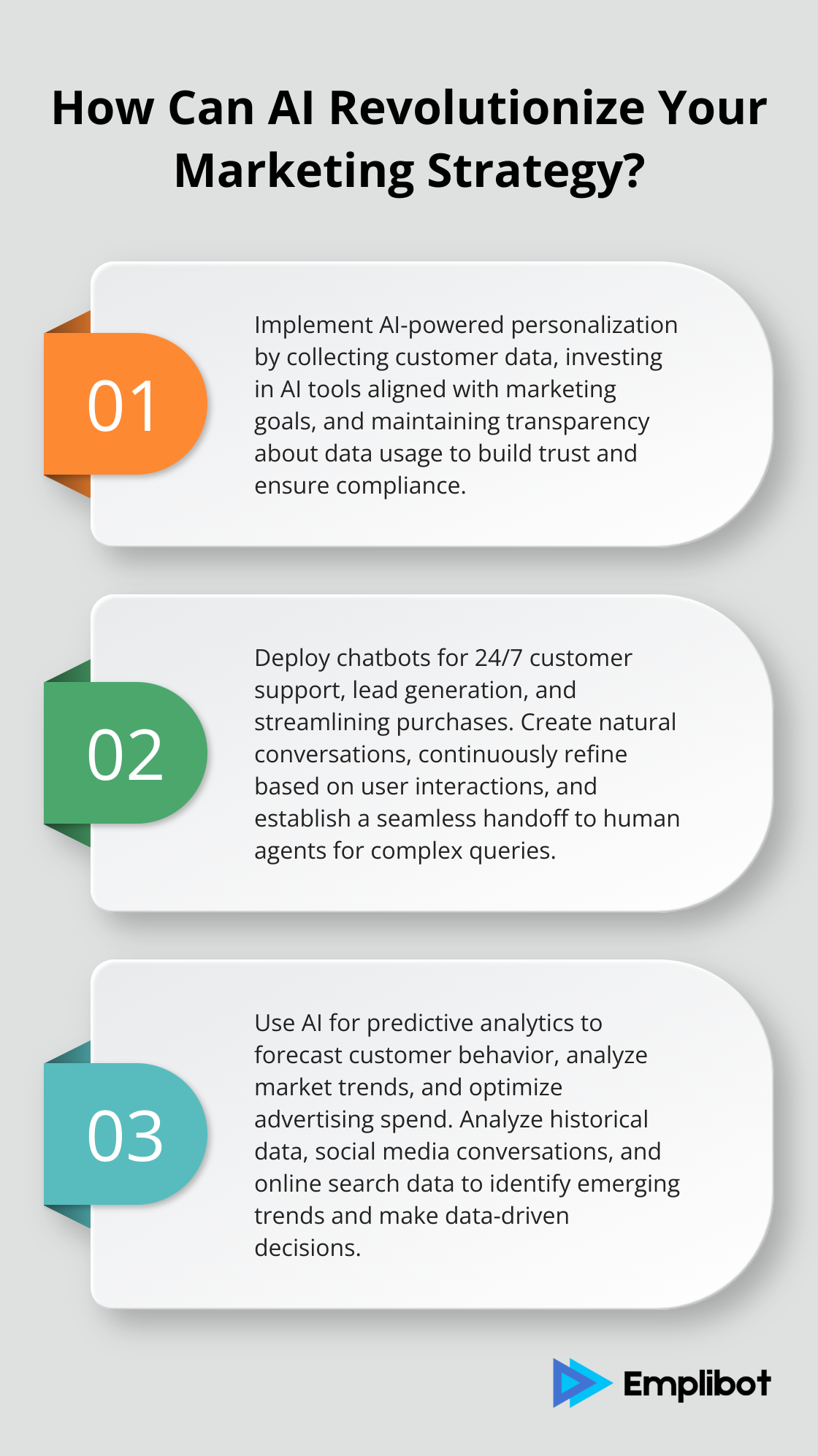Artificial Intelligence is revolutionizing marketing strategies across industries. At Emplibot, we’ve observed a surge in brands using AI for marketing to gain a competitive edge.
From personalized content delivery to predictive analytics, AI is reshaping how companies connect with their audiences. This post explores the innovative ways brands are harnessing AI’s power to transform their marketing efforts and drive results.
How Are Brands Personalizing Marketing with AI?
AI-powered personalization transforms marketing strategies, allowing brands to create highly targeted and relevant experiences for their customers. This technology reshapes the marketing landscape, offering new ways to connect with audiences.
Tailoring Content and Recommendations
AI in marketing excels at content personalization. Netflix uses AI algorithms to analyze viewing habits and preferences, resulting in personalized recommendations that keep users engaged. This AI-driven approach saves Netflix $1 billion annually in customer retention.

Amazon’s recommendation engine demonstrates the power of AI in driving revenue through personalized product suggestions. This engine accounts for 35% of their total sales, highlighting its effectiveness.
Dynamic Pricing Strategies
AI revolutionizes pricing strategies. Airlines and hotels have used dynamic pricing for years, but AI takes it to a new level. Uber’s surge pricing model uses AI to adjust prices in real-time based on demand, weather conditions, and other factors.
Retailers follow suit. Best Buy implemented AI-driven dynamic pricing, which led to a 100-200% increase in profit margins for some product categories (as reported by Harvard Business Review).
Personalized Email Marketing Campaigns
Email marketing remains a vital channel, and AI makes it more effective than ever. Spotify’s Discover Weekly playlist, sent via email, uses AI to curate personalized song recommendations for each user. This feature accounts for about 31% of all Spotify listening time, according to the company.
Stitch Fix, an online personal styling service, uses AI to analyze customer preferences and send highly personalized product recommendations via email. This approach has helped them achieve a customer retention rate of 30%, significantly higher than the industry average.
Implementing AI-Powered Personalization
To implement AI-powered personalization effectively, brands should:
- Collect and organize customer data: This forms the foundation for AI algorithms to work their magic.
- Invest in AI tools: Choose solutions that align with specific marketing goals (content recommendation, dynamic pricing, or email personalization).
- Maintain transparency: Be open with customers about data usage and provide options for controlling their data. This builds trust and ensures compliance with data protection regulations.
As brands continue to harness the power of AI for personalization, the next frontier lies in enhancing customer engagement through conversational AI and chatbots. These technologies promise to revolutionize how brands interact with their audiences in real-time.
How Are Chatbots Revolutionizing Customer Engagement?
Chatbots and conversational AI transform how brands interact with customers, offering round-the-clock support and streamlining various marketing processes. Companies leverage these technologies to enhance customer engagement and drive business growth.
Providing 24/7 Customer Support
Chatbots excel in customer support. H&M, the global fashion retailer, implemented a chatbot on their website and mobile app that handles customer inquiries 24/7. This bot answers common questions about sizing, stock availability, and order tracking, reducing the workload on human customer service representatives.

Domino’s Pizza introduced a chatbot that allows customers to place orders via Facebook Messenger. This AI-powered assistant has contributed to Domino’s digital ordering service expansion.
Enhancing Lead Generation and Qualification
Chatbots capture and qualify leads effectively. Drift, a conversational marketing platform, reported that their clients see an average increase in lead generation after implementing chatbots on their websites.
Lyft’s implementation of a chatbot within Slack and Facebook Messenger stands out. This bot allows users to request rides directly from these platforms, significantly expanding Lyft’s reach and generating new leads.
Streamlining the Purchase Process
AI-powered chatbots prove invaluable in guiding customers through the buying journey. Sephora’s Virtual Artist chatbot uses augmented reality to allow customers to try on makeup virtually before making a purchase.
eBay’s ShopBot helps users find products by asking questions about their preferences. This chatbot has improved eBay’s customer engagement rates.
Implementing Chatbots Effectively
To implement chatbots and conversational AI successfully, brands should:
- Create natural, human-like conversations
- Continuously refine their bots based on user interactions
- Establish a seamless handoff process to human agents for complex queries
The integration of chatbots with other AI technologies like natural language processing and machine learning will further enhance their capabilities. This advancement will make them even more valuable for customer engagement and marketing strategies.
As chatbots continue to revolutionize customer interactions, brands also turn to AI for deeper insights into customer behavior and market trends. Predictive analytics and AI-driven insights offer a powerful way to forecast future trends and optimize marketing strategies.
How Can AI Predict Customer Behavior and Market Trends?
Predictive analytics and AI-driven insights transform how brands understand and anticipate customer behavior, market trends, and advertising effectiveness. These technologies enable businesses to make data-driven decisions that significantly impact their bottom line.
Forecasting Customer Behavior
AI predicts customer actions based on historical data and current trends. Predictive analytics aims to identify potential patterns, events, and behaviors in the future based on historical data. North Face uses IBM Watson’s cognitive computing to help customers find the perfect jacket. This AI-powered tool asks customers questions about their preferences and intended use, then analyzes this data along with weather conditions to recommend the most suitable products.

Starbucks uses AI to analyze factors such as order history, time of day, and weather to predict what a customer might order next. This predictive capability allows Starbucks to personalize its mobile app experience and make tailored suggestions, leading to increased customer satisfaction and sales.
Analyzing Market Trends
AI processes vast amounts of data to identify and analyze market trends. Unilever uses AI to analyze social media conversations and online search data to identify emerging trends in the beauty and personal care industry. This approach helped Unilever launch its Love Beauty and Planet brand, which was developed in just six months based on AI-driven insights about consumer preferences for natural and sustainable products.
In the fashion industry, Zara uses AI to analyze store receipts, returns, and stock data to predict and respond to fashion trends quickly. This AI-driven approach allows Zara to design, produce, and deliver new styles to stores in as little as two weeks, giving them a significant competitive advantage in the fast-fashion market.
Optimizing Advertising Spend and ROI
AI revolutionizes how brands allocate their advertising budgets and measure return on investment. Harley-Davidson of New York City implemented Albert (an AI-powered marketing platform) to optimize its ad spend across channels. The AI tool, Albert, drove in-store traffic by generating leads, defined as customers who express interest in the brand’s products.
The Economist used AI to analyze reader behavior and optimize its subscription marketing efforts. By using machine learning algorithms to identify the best times and channels to target potential subscribers, The Economist increased its subscription rate while reducing its cost per acquisition.
Emplibot’s AI-Driven Content Optimization
While many platforms offer AI-driven insights, Emplibot stands out as the top choice for content optimization. Emplibot’s advanced algorithms analyze content performance across various channels, helping businesses optimize their content strategy for maximum engagement and ROI. This AI-powered approach ensures that businesses can stay ahead of the curve and drive sustainable growth in an increasingly competitive marketplace.
Final Thoughts
AI has transformed marketing strategies, enabling unprecedented personalization, engagement, and data-driven decision-making. Brands using AI for marketing experience tailored content, dynamic pricing, and enhanced customer support through chatbots and conversational AI. Predictive analytics and AI-driven insights empower marketers to forecast customer behavior, analyze trends, and optimize advertising spend with remarkable accuracy.

The future of AI-driven marketing will likely see advancements in natural language processing and content creation tools. Integration with emerging technologies like augmented reality and the Internet of Things will open new avenues for immersive marketing experiences. However, successful strategies will balance AI-driven efficiency with human creativity, empathy, and strategic thinking.
Emplibot understands the transformative power of AI in marketing. Our AI-powered content marketing solution helps businesses automate their WordPress blogs and social media presence. We enable brands to increase their traffic, leads, and sales while saving time and resources (without compromising quality).

